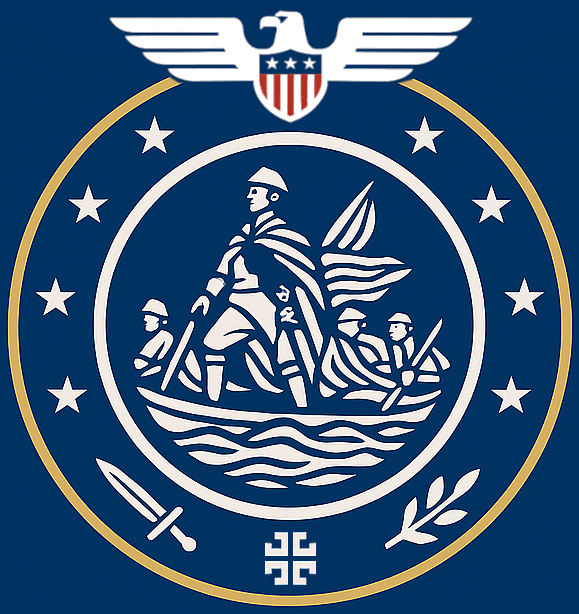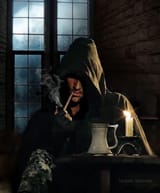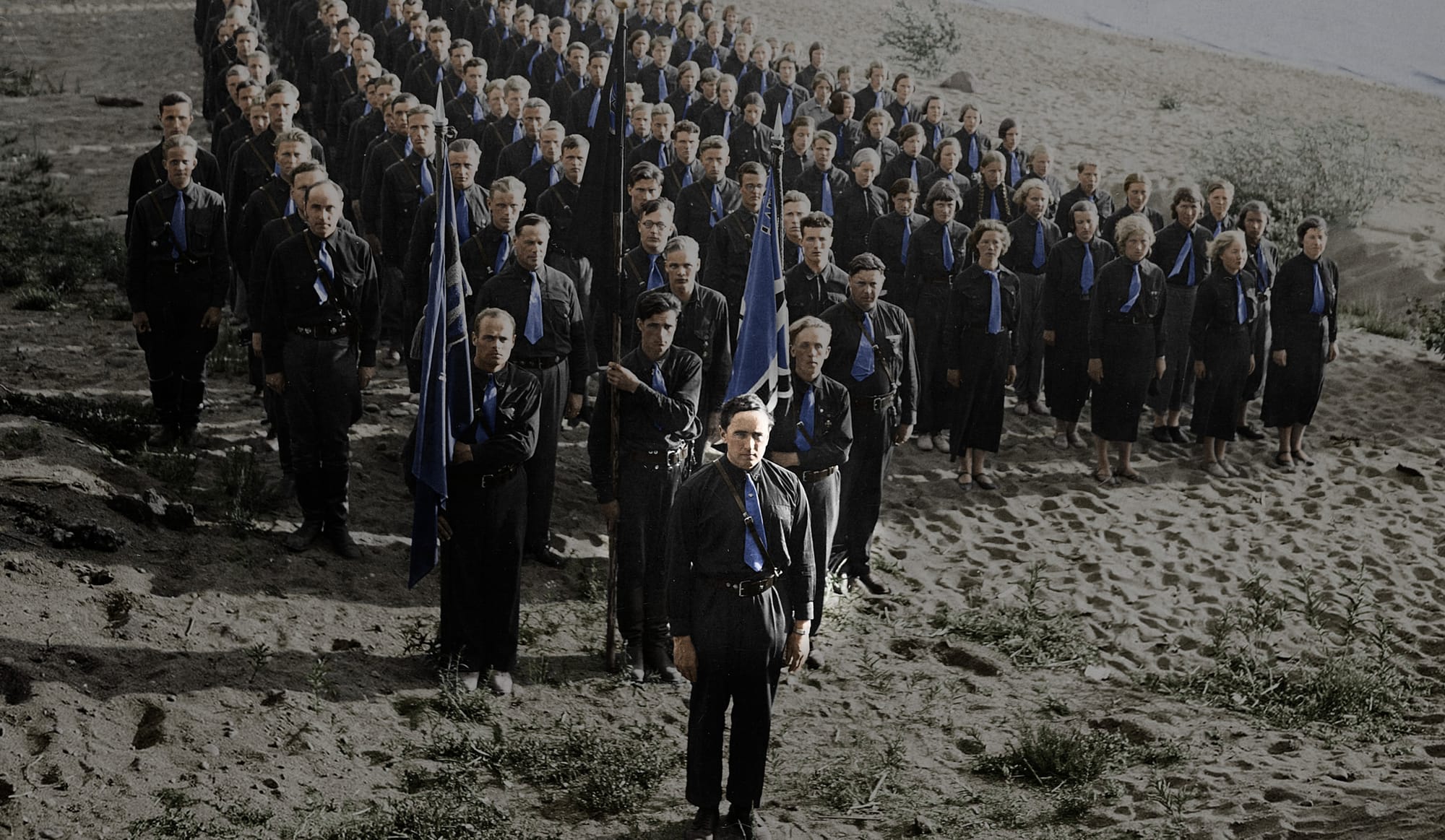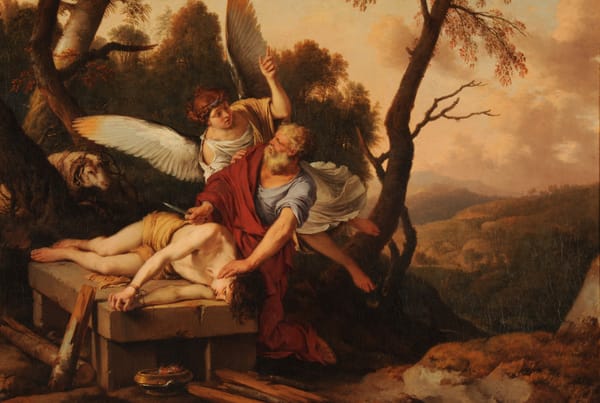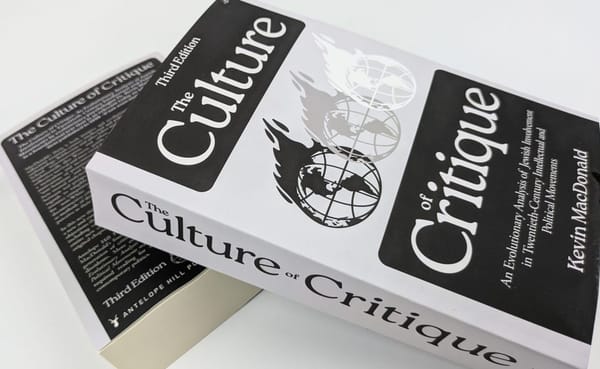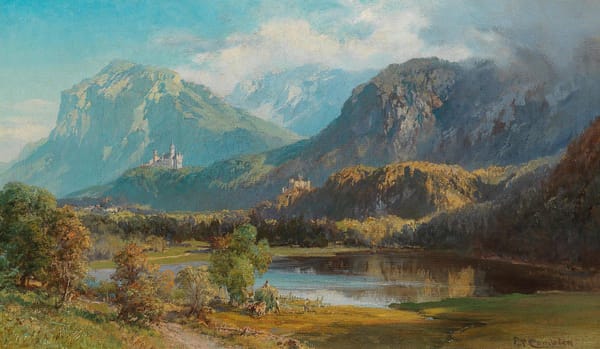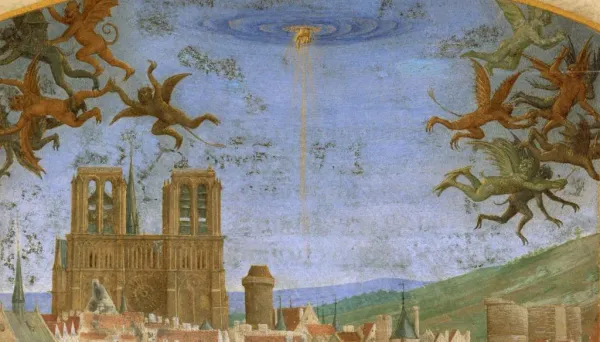Burning Mercy: A Review of The Burning Bush by Elias Simojoki
In every great epoch of a people’s history, there is a luminary whose very life captures the whole scope of the collective people.
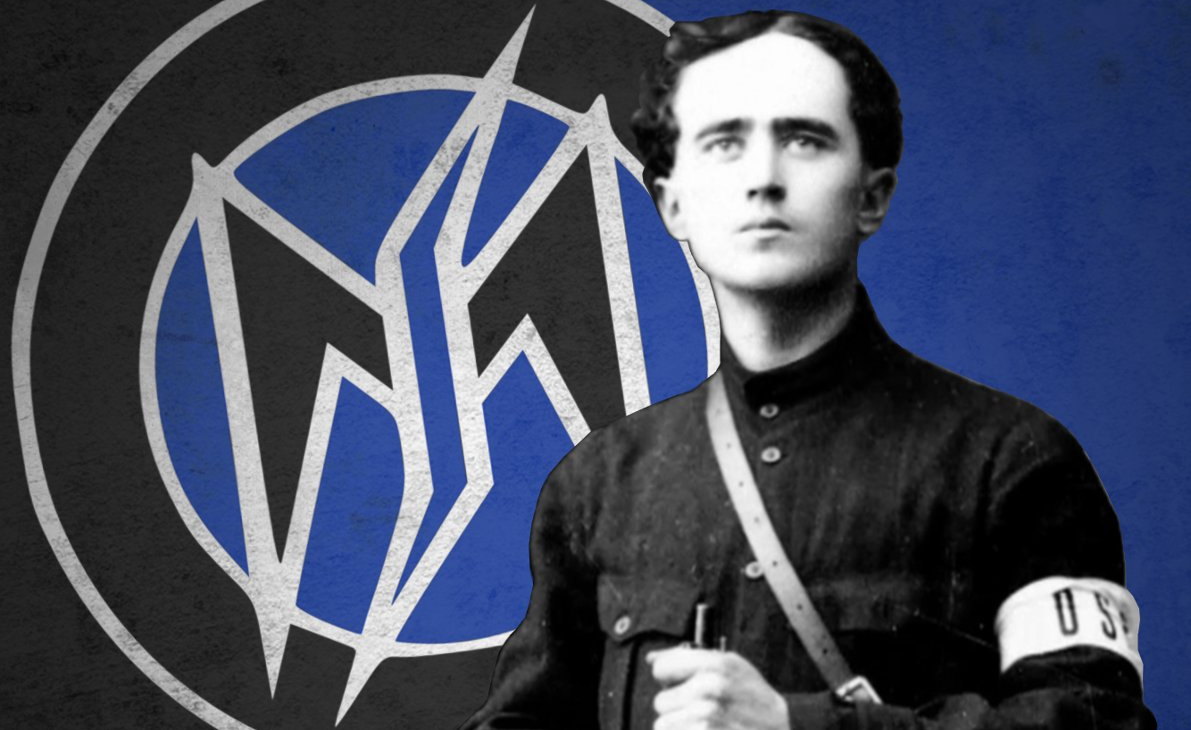
For time immemorial the Finns had been a nation without a state, a people without a collective voice. Centuries passed as the lands of their dwelling were controlled by the kingdom of Sweden, only later to be made a grand duchy of the Russian Empire; but, this all changed during the Finnish War of Independence in 1917. Amid the chaos of the Bolshevik Revolution, the Finns broke from the collapsing Russian Empire and formed into a modern nation-state based upon a sovereign Finnish peoplehood. The glory of that struggle and the fresh air of a new freedom that filled the lungs of Finns inflamed Finnish nationalism across their new borders. Flags, songs, parades, youth movements, and days of celebration overflowed in a unity of national fellow-feeling. A bright future for a rising Finland lay ahead.
But these celebrations and hopes were quickly overshadowed by a Communist faction that sought the overthrow of the new Finnish nationalist government. Just days after Finland declared independence from Russia on December 6, 1917, the Finnish Civil War (January–May 1918) erupted. It was a conflict between the socialist Reds, led by the Social Democratic Party, and the conservative Whites, who won the conflict, supported by the Senate and backed by German forces. The White victory solidified nationalist, conservative ideals in the government and in the people. It gave birth to hopes of a “Greater Finland”—the rescuing, and perhaps annexing, of ethnic Finns still in Soviet-controlled Karelia, which lay on the eastern borders of Finland. All good men of fighting age flocked to save their country from these Communist agents in their lands. These same men now stood free and victorious, looking to what triumphs lay ahead.
One such nationalist fighter was an 11th grader who left his studies to join the war front. By disposition he was a kind young man, loving animals, books, and even poetry. He would later become a Lutheran priest, whose piety toward God and love of his fellow countrymen rivaled any canonized saint; but when he saw the ethnic consciousness of his people awakening, the shaking off the shackles of centuries of foreign rule, and the attempt of internal Communist agents staging military coups to thwart it, this budding man left his studies prematurely, or we should say temporarily, to take up his nation’s cause in battle and blood. His name was Elias Simojoki.
Student, teacher, warrior, priest, statesman, orator: Elias Simojoki, like the burning bush, was continually aflame for the cause of the Finns. Where he could, he warred for his fatherland. During peace, he wielded his gift of oratory to rally Finns, to awaken consciousness of their peoplehood, and to fight further to rescue the Finnish folk still in enemy territory.
In every great epoch of a people’s history, there is a luminary whose very life, words, or actions capture the whole scope of the collective people, as though the whole land had produced a barley crop that distilled to one single barrel of liquor. The life of that land, the labor of its people, their suffering, hopes, toils, ideas all summed in a single symbol. If you would distill the spirit of Finnish nationalism to its essence, the awakening of a people, the struggle for existence and freedom, then you must read the speeches of Elias Simojoki collected in The Burning Bush, published by Antelope Hill.
The foremost feature of Simojoki’s speeches is something that cannot be told, only shown. Though his speeches are now only to be read, yet one is struck by the passionate intensity of the man. He was truly a burning bush, lighting the path forward for his people, for each time he mounted the stage and opened his mouth he burned for his fatherland—its sufferings, victories, and future struggle. Only his full speeches can convey the depth of his soul.
The early experiences in war awoke something in Simojoki, but not in all Finns. In a speech called Finland’s Dawn, he roused his countrymen to awaken to the fight for their future, their unification, their survival. After having fought but failed to free Finns in Kaleria, he reflects,
“And yet, what makes the pain this causes all the more unbearable, is the sad observation that becomes more obvious day by day and year by year, that the Finnish people are not awake…What else is it proof of, than of a slave mentality, when a people cannot even dream of the greatness of which they are actually fully deserving?...Every nation and people that have become great and powerful, has begun by daring to dream of its own greatness and to elevate themselves above others in their national pride and self-esteem.”
Simojoki’s foremost efforts always were to awaken his people to their peoplehood, to dream, and to imagine a Greater Finland for themselves that had never been but which they might achieve.
Indeed, elsewhere he said that the struggle for national life and peoplehood does not begin until awakening occurs: “The struggle began when we boldly accused our entire people to their face: you remain asleep, you have no national identity, you are not truly independent, you have the mentality of a slave, and if you do not awaken, you shall drown!” He also said, “For there to be victory, there must be a battle.” So long as a people remains asleep, it can dream of peace, but Simojoki says this is only the comfort of a slave, and one doomed to death. To awaken is to live, but it is also to fight. The rest of his speeches are filled with imagery of awakening, struggling, and imagining a Finnish future.
Sacrificing everything for people and Fatherland saturated Simojoki’s rhetoric. Without this subordination to the greater good, no national life, greatness, or freedom is possible. Awakening leads to a fight, and fighting requires sacrifice to greater, higher things. In a speech entitled Revolution In The Hearts Of Our People, he said,
“In the coming battle, we wish nothing for ourselves. We are happy to become insignificant if the Fatherland can become great. We will gladly be poor if the Fatherland is to become rich. We are glad to accept shame and humiliation if the Fatherland’s path to glory and honor must pass through our degradation. We will fall into the dust for the nation to use us as a stepping stone if this allows it to ascend higher. The only treasure we desire is the one that rewards our sacrifice and poverty in ways invisible to others. This is the treasure the Fatherland itself offers to us, and therefore we offer ourselves to the Fatherland in turn. The Holy Book says this treasure is the greatest of all: love.”
Love is the greatest virtue, and love is sacrifice, specifically laying one’s life down for one’s friends. Simojoki applied this idea to the nation itself as a matter of political and military principle. Elsewhere, in a speech entitled “Peace Upon The Earth”, he said,
“We have a valuable inheritance to claim in the land in which our forefathers’ bones are buried. We must learn to continuously work toward doing this and be prepared to sacrifice ourselves for it…It is our duty to create a free Fatherland for tribal brethren, a free and great Fatherland for our descendants…Let us pray that we shall prove ourselves worthy, so that we may leave our land and people to the future generations even greater and more lovely than the previous generations gave it to us.”
The reader will notice Simojoki’s religious language in the above quotations: God, prayer, the Holy Book, a sense of providence. An ordained Lutheran priest, Simojoki invoked the Almighty and Christian theology toward a nationalist framework of ethnic consciousness and defense. Indeed, said Simojoki, the whole history of the Finns, especially their recent victories of independence, were due to God’s providence:
“…we must not be arrogant, as if this all was our own achievement. It was the God of our forefathers who carried and guided us in everything; it was Him we turned to when lying in the trenches in snowy forests; it was Him we addressed when we crossed our frostbitten fingers. It was a worthy battle we fought in the front. More worthy still was the battle of righteous mothers and fathers in each village in Ostrobothnia, when they prayed to the living God with anguished worry in their hearts. For it must be said, that all that is good that has happened to this country has been through mercy, for which we are merely the weak vessels.”
“We are merely the weak vessels.” All great actions of men on the stage of history are driven by a conviction of divine providence and favor. Simojoki would agree that as with man, so with nations: “Except the Lord build the house, they labour in vain that build it: except the Lord keep the city, the watchman waketh but in vain.”
God is central to Simojoki’s nationalism. At the founding speech of the AKS, a nationalist youth organization which Simojoki helped to create, he explained how the love of God leads to the love of one’s ethnic people:
“A real and living relationship with God creates a deeper love of the people than anything else, since, after all, its real focus is on the people’s immortal souls. As an example, think of Moses, who led his people through the wilderness to the Promised Land. When Israel was met with divine wrath, Moses said, “But now, please forgive their sin—but if not, then blot me out of the book you have written.” Such was the prophet, who wept for the downfall of his people on the smoking ruins of Jerusalem declaring, “Oh, that my head was a spring of water and my eyes a fountain of tears! I would weep day and night for the slain of my people. My heart is faint within me. Since my people are crushed, I am crushed; I mourn, and horror grips me.” Such was Paul, who said: “For I could wish that I myself were cursed and cut off from Christ for the sake of my people, those of my own race,” and yet, his only reward from his own people were chains and a back that had been flogged till it bled.”
Holy prophets and apostles themselves felt the burning love of kin as did the Finnish nationalist Elias Simojoki. He saw no difference in their affection and his—the desire to sacrifice himself for his Fatherland and people as Moses and Paul desired. And did not Jesus sacrifice himself precisely for his people? What can be more Christian than to do likewise?
In a speech entitled “A Christian Love Of One’s Brethren”, Simojoki made crucial distinctions in the ordo amoris—the order of loves—that are sorely lacking in the Liberal Western world. There is a higher love of God and longing for heaven, but this does not absolve earthly loves and duties:
“A Christian’s fatherland is above, and here on Earth, he is a guest and foreigner, with no permanent abode. Because of this, the Lord’s Own search for their Fatherland as weary travelers and wait for their moment of eternity. But as they wait with longing in their hearts in this ditch of mercy, it is nevertheless in the priceless Fatherland that their own fathers have spent their Earthly travels in. They know that they come from this land and that they will again become of this land.
“Because of this, each palm’s width of this land is too precious to be trodden upon by the enemy’s feet. Above all, this land is precious for them, because it is lived in by a people who are flesh of their flesh and blood of their blood. A true and living love toward God has always created a deeper and more true love toward one’s own people than anything else, for it is concerned with the immortal souls of the same people, whose blood they can hear pumping in their own veins.”
“Immortal souls…whose blood we hear pumping in their own veins,” captures the poignant imagery of Simojoki’s rhetoric. Put more formally, Simojoki recognized that grace doesn’t destroy but restores nature. True Christianity does not dissolve natural bonds but forms and sanctifies them. Simojoki knew this. He felt it. He lived it. If we love the soul, we must love the blood. If we love heaven, we must love our Fatherland. We may be awaiting an eternal home, but that doesn’t render our earthly Fatherland less but more precious, for it is the beginning of our journey to holiness.
There are many more of Simojoki’s speeches—bursting with hope, sorrow, life, longing, intimate love of his people, and the retelling of recent events that bring contextual depth. But I must turn to one last important theme: Finland’s struggle as one of defending Western civilization against the menace of the East’s atheism and Communism (in Soviet Russia). In his speech, Finland’s Dawn, he said, “the task (has fallen to us) of defending the entire civilized world from the imperialist raids of barbarians (Soviets).” In another speech he likewise said, “We know that our nation has the duty to become great because otherwise, we cannot fulfill our mission as a protective shield for the Western nations against the East.”
The best way to do this, said Simojoki, was to go on the offensive with the main objective of capturing Karelia where their Finnish sister-tribal people lived. If they could unite to become a Greater Finland, this would make them strong enough to defend against the menace of the East. In a speech entitled “Toward The Storm”, he said,
“…the land of red twilight prepares once again to attack the peace-loving people of Finland, and after us, all of Western Civilization. But if we were to only awaken to the fear of God and a living sense of nationalism, we could face this storm with confidence.”
Simojoki was here specifically decrying the deportation of Ingrain Finns from the borders of Kaleria and Finland to gulags in central Russia. Approximately 18,000 Ingrain and Karelian Finns were deported during this time—those living on the eastern borders of Finland but in Soviet territory. The Soviets deported another 27,000 a few years later. By 1939 some 43% of Finns in Karelia had been killed or deported. Simojoki had been warning that this would happen and that Finland must act, not only to save their fellow Finns but also because the Soviets would do the same to Finland next.

Finland didn’t have to wait long for Soviet Russia to invade them. During the Winter War—a war in 1939/40 between Soviet Russia and Finland that lasted merely three and a half months—Russia completely plundered the Finns and began a systematic genocide of those remaining in Soviet territory. Some 400,000 fled from the region. Initially, Germany took Finnish refugees fleeing this conflict, but after WWII Russia took them back and sent them to central Russia to work in camps. Karelia became a wasteland of burnt fields, towns, and factories. Finns in Karelia were completely genocided or dissolved. Simojoki for years had warned in speech after speech of this coming danger.
During times of peace, Simojoki predicted this would happen. He had called his countrymen to rise from their newly won peace, to not rest on their laurels, but to struggle for ethnic consciousness, unity, and life. Perhaps those Karelian Finns would have had a better fate had their tribal brethren just across the border heeded the voice of the Burning Bush among them.
Elias Simojoki himself met his fate in that very same Winter War on the field of battle—41 years of age, a priest, a statesman, and a veteran of three prior conflicts. It was his masculine vigor which led him again to engage in battle, but it was his tender compassion which brought his death. The boy who once loved animals was now a man who loved them still. A horse writhed in its last agony between the battle lines. Simojoki skied out across the white waste, a flame upon the snow, to end the beast’s torment with a single stroke. He succeeded. Mercy invaded no-man’s land. But at that same frozen moment, the merciless steel of a Soviet gunner pierced the cold. The Burning Bush was extinguished.
Afterward, it appears that Finland did honor this priest and prophet in their midst. For an obituary entry in the Viena-Aunus Magazine, 1940, no. 1-2, gives fitting remarks to this remarkable man, which I quote in full:
“Former Member of Parliament, priest Lauri Elias Simojoki fell in the battle for the fatherland on the 18th of last month at the age of 41. He had been born in Rautio, became a student in 1919, graduated as Master of theology and was ordained a priest in 1923. He served as a priest in several parishes, since 1929 – as second priest in Kiuruvesi Parish. The decedent was one of the founding members of the Academic Karelia Society and a Member of Parliament in 1933-1938.
“Elias Simojoki was a fighter, fiery and so brave. He gave everything for the cause which he represented. In the same way he fought hard for the cause of Karelia, both in words and in deeds. After taking part in the Finnish War of Independence in the First Front Squad of Oulu and as Kajaani Guerrilla skier, he took part at 1919 in the battles for the freedom of Olonets Karelia in the regiment under the command of Major von Hertzen, and at 1921 in the battles for the freedom of Karelia in the demolition detail. Numerous are the fiery speeches that Simojoki made for our cause and the works that came out of his pen. Whether all of his methods were right, somebody can disagree. However, of one thing there can be no doubt: Elias Simojoki was a warrior, a fighter not only on the battlefields, but also in peace works, he fought for the causes he thought were right. The latest data show that Elias Simojoki fearlessly and heroically fought with arms in the line of fire not for the beloved fatherland only, but also, as we are sure, remembering the future freedom of the beloved Karelian tribe.”
To all Finns past and present, and to all who love their Fatherlands: ignite, and burn in mercy for your people.
Remember Elias Somojoki.
ATTENTION READER: We need your help.
Institutional trust is at record lows. But without institutions, we cannot renew our people, much less provide an inheritance to posterity. In response to this crisis and as an organic outgrowth both of necessity and natural interest, American Mantle exists. And so we make our appeal.
Donate to the Cause. Help us reach our monthly goal in order to solidify this crucial institution.
